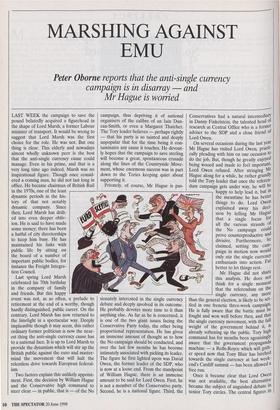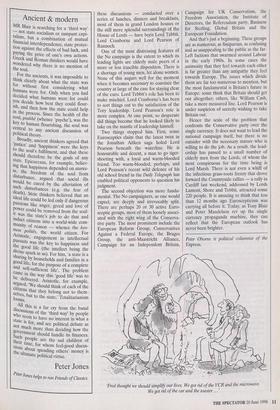MARSHING AGAINST EMU
Peter Oborne reports that the anti-single currency
campaign is in disarray — and Mr Hague is worried
LAST WEEK the campaign to save the pound belatedly acquired a figurehead in the shape of Lord Marsh, a former Labour minister of transport. It would be wrong to suggest that Lord Marsh was the first choice for the role. He was not. But one thing is clear. This elderly and nowadays almost wholly unknown peer is the best that the anti-single currency cause could manage. Even in his prime, and that is a very long time ago indeed, Marsh was no inspirational figure. Though once consid- ered a coming man, he did not last long in office. He became chairman of British Rail in the 1970s, one of the least dynamic periods in the his- tory of that not notably dynamic company. Since then, Lord Marsh has drift- ed into even deeper obliv- ion. He is said to have made some money; there has been a hatful of city directorships to keep him busy. He has maintained his links with public life by sitting on the board of a number of important public bodies, for instance the Freight Integra- tion Council.
Last spring Lord Marsh celebrated his 70th birthday in the company of family and friends. But this happy event was not, as so often, a prelude to retirement at the end of a worthy, though hardly distinguished, public career. On the contrary, Lord Marsh has now returned to the limelight in a spectacular way. Deeply implausible though it may seem, this rather ordinary former politician is now the near- est thing the anti-single currency cause has to a national face. It is up to Lord Marsh to provide the dynamism which will stir up the British public against the euro and master- mind the movement that will halt the relentless drive towards European federal- ism.
Two factors explain this unlikely appoint- ment. First, the decision by William Hague and the Conservative high command to steer clear — in public, that is — of the No campaign, thus depriving it of national organisers of the calibre of an Iain Dun- can-Smith, or even a Margaret Thatcher. The Tory leader believes — perhaps rightly — that his party is so tainted and deeply unpopular that for the time being it con- taminates any cause it touches. He devout- ly hopes that the campaign to save sterling will become a great, spontaneous crusade along the lines of the Countryside Move- ment, whose enormous success was in part down to the Tories keeping quiet about supporting it.
Privately, of course, Mr Hague is pas- sionately interested in the single currency debate and deeply involved in its outcome. He probably devotes more time to it than anything else. As far as he is concerned, it is one of the two giant issues facing the Conservative Party today, the other being proportional representation. He has given an immense amount of thought as to how the No campaign should be conducted, and over the last few months he has become intimately associated with picking its leader. The figure he first lighted upon was David Owen, the former leader of the SDP, who is now at a loose end. From the standpoint of William Hague, there is an immense amount to be said for Lord Owen. First, he is not a member of the Conservative party. Second, he is a national figure. Third, the Conservatives had a natural intermediary in Danny Finkelstein, the talented head of research at Central Office who is a former adviser to the SDP and a close friend of Lord Owen.
Mr Hague did not share this analysis. He does not think for a single moment that the referendum on the single currency, any more than the general election, is likely to be set- tled in one frenetic three-week campaign. He is fully aware that the battle must be fought and won well before then, and that the single currency movement, with the full weight of the government behind it, Is already softening up the public. Tory high command has for months been agonisingly aware that the government propaganda machine — a Rolls-Royce which will gath- er speed now that Tony Blair has lurched towards the single currency at last week- end's Cardiff summit — has been allowed a free run.
Once it became clear that Lord Owen was not available, the best alternative became the subject of anguished debate in senior Tory circles. The central figures in these discussions — conducted over a series of lunches, dinners and breakfasts, most of them in grand London houses or the still more splendid surroundings of the House of Lords — have been Lord Tebbit, Lord Cranborne and Lord Pearson of Rannoch.
One of the most distressing features of the No campaign is the extent to which its leading lights are elderly male peers of a more or less irascible disposition. There is a shortage of young men, let alone women. None of this augurs well for the moment when it becomes necessary to convince the country at large of the case for staying clear of the euro. Lord Tebbit's role has been to make mischief. Lord Cranborne's has been to sort things out to the satisfaction of the Tory leadership. Lord Pearson's role is more complex. At one point, so desperate did things become that he looked likely to take on the mantle of leadership himself.
Two things stopped him. First, some Eurosceptics claim that the latest twist in the Jonathan Aitken saga holed Lord Pearson beneath the waterline. He is honourable and decent, a man to go tiger- shooting with, a loyal and warm-blooded friend. Too warm-blooded, perhaps, and Lord Pearson's recent wild defence of his old school friend in the Daily Telegraph has enabled political opponents to question his judgment. The second objection was more funda- mental. The No campaigners, as one would expect, are deeply and irrevocably split. There are perhaps 20 or 30 active Euro- sceptic groups, most of them loosely associ- ated with the right wing of the Conserva- tive party. The most prominent include the European Reform Group, Conservatives Against a Federal Europe, the Bruges Group, the anti-Maastricht Alliance, Campaign for an Independent Britain, Campaign for UK Conservatism, the Freedom Association, the Institute of Directors, the Referendum party, Business for Sterling, Global Britain and the European Foundation. And that's just a beginning. These groups are as numerous, as fissiparous, as confusing and as unappealing to the public as the far- Left factions that swarmed around Labour in the early 1980s. In some cases the animosity that they feel towards each other is far greater than any antipathy they feel towards Europe. The issues which divide them are far too numerous to mention, but the most fundamental is Britain's future in Europe: some think that Britain should get out altogether; others, like William Cash, take a more measured line. Lord Pearson is under suspicion of secretly wishing to take Britain out.
Hence the scale of the problem that confronts the Conservative party over the single currency. It does not want to lead the national campaign itself, but there is no outsider with the necessary stature who is willing to do the job. As a result, the lead- ership has passed to a small number of elderly men from the Lords, of whom the most conspicuous for the time being is Lord Marsh. There is not even a whiff of the infectious grass-roots frenzy that drove forward the Countryside rallies — a rally in Cardiff last weekend, addressed by Lords Lamont, Shore and Tebbit, attracted some 220 people. It is amazing to think that less than 12 months ago Euroscepticism was carrying all before it. Today, as Tony Blair and Peter Mandelson rev up the single currency propaganda machine, they can reflect that the European outlook has never been brighter.
Peter Oborne is political columnist of the Express.
`Fred thought we should simplify our lives. We got rid of the VCR and the microwave. We got rid of the car and the toaster . .



























































 Previous page
Previous page